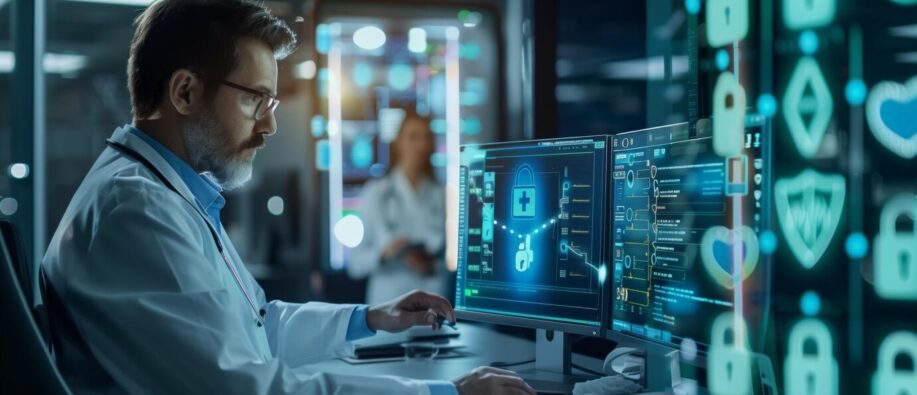Cybercrime is a common event in every industry, including healthcare. Companies operating in the medical sector deal with sensitive patient data, including their medical history, treatments, clinical challenges, and others. In the case of cyberattacks, criminals can steal and unethically use such information against the organization, as well as the patients.
Data states that the medical sector is among the most vulnerable industries to cybercrime after manufacturing and finance. Phishing, ransomware, malware, etc., are the common methods of cybercrime against healthcare companies. After each attack, organizations encounter an average financial harm of $9-$10 million. Therefore, preserving cybersecurity in healthcare is crucial.
This blog shall shed light on the importance of cybersecurity in healthcare. Additionally, we shall discuss a few tools to establish a strong healthcare cybersecurity infrastructure.
What is Cybersecurity in Healthcare?
Like other industries, healthcare has also integrated technology. From storing patient information to carrying out medical procedures, innovation is everywhere in clinical facilities. Such integrations make user information prone to cyber-attacks, where individuals with ill intentions can steal and misuse data, breaking into the systems of healthcare firms.
While protecting data, medical organizations adopt various measures. This process is called cybersecurity in healthcare. It is essential to sustain stringent cybersecurity in clinical firms to restrict financial losses, safeguard patient data, secure medical devices, protect organizational reputation, and others.
There are multiple ways to secure data in the healthcare sector, such as data encryption, access authentication, continuous security scrutinization, employee training, and cybersecurity tool integration. Below are a few tools to protect healthcare cybersecurity that comply with HIPAA regulations.
Best Tools to Restore Cybersecurity in Healthcare:
Crowdstrike:
Crowdstrike is an all-in-one cybersecurity tool for the medical sector. Its Falcon platform is a cloud-native, data-centric, and AI-native site that helps organizations secure their data and offers scalability.
The tool enables advanced endpoint security that efficiently protects data. The Falcon platform follows a Managed Detection and Response (MDR) process that allows users to have 24*7 security surveillance. Moreover, it is cost-effective, so organizations can easily employ it.
Imperva:
Imperva offers consolidated security to its users with deeper protection and quicker responses. It is an excellent platform to concrete cybersecurity in healthcare industry that provides end-to-end protection measures.
EMR data protection, EMR application resilience, integrated compliance, and securing patient data are the characteristics of imperva as a medical cybersecurity tool.
Check Point:
Check Point is an AI-enabled cybersecurity platform for diverse industries. While securing the medical sector, this site aims at keeping the patients safe, clinical data protected, and medical facilities operational. The products of Check Point not only protect data on systems but also safeguard healthcare devices.
It integrates a multi-cloud infrastructure to offer advanced security measures. Check Point products include Cloud, Mobile, IoT, and Unified Threat Prevention. The threat prevention platform also provides Zero trust and least privilege facilities.
GE Healthcare:
GE Healthcare is a clinical facility-providing platform that also offers cybersecurity services. At its core, the platform promotes innovation to address cyberthreats and medical issues. GE Healthcare protects patient data and secures medical devices.
It offers a variety of security services, including facility ecosystem creation, network firewall, malware threat protection, local or remote access management, PHI encryption, etc.
Imprivata:
Imprivata is a top security-providing tool in 2024 that offers advanced digital identity protection services in the healthcare domain. It aims to enhance medical care quality and limit cyber risks by prioritizing privacy.
imprivata's key facilities include ERP optimization, improvement of workflow efficiency, streamlining regulatory compliance, automation identity management, protection of patient data, and others.
Summing up!
Many a time, people overlook the sensitive topic of cybersecurity in healthcare due to a lack of awareness. However, it is high time to adopt measures to address such issues and protect patient data from cybercriminals. The tools and platforms we have mentioned above are the best to protect medical data. These offer all-round protection measures in the healthcare sector. Refer to our other blogs to get ideas about different types of cybercrimes.
You may also like to read:





